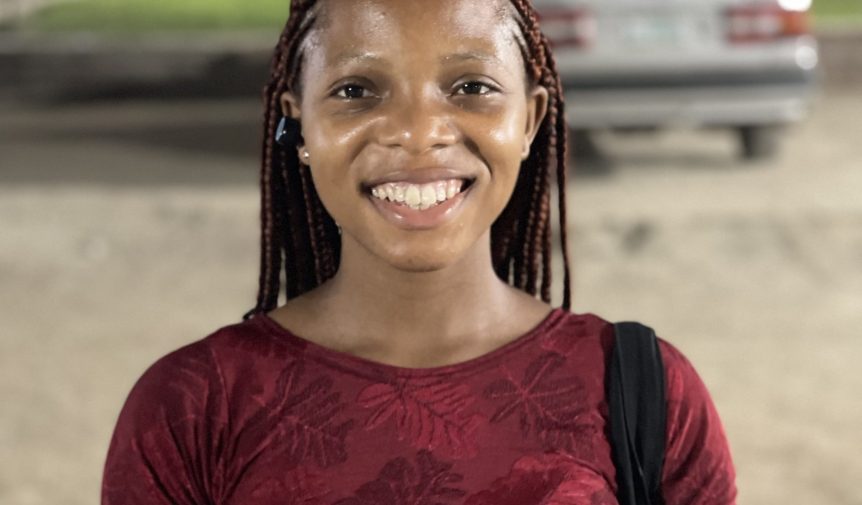“It is easier to build strong children than to repair broken adults.” –Frederick Douglass
Since 2018, we have engaged with young school children through our Health and Hygiene Clubs, where they learn healthy habits that stop the spread of diseases and promote these habits to those around them. In this piece, we spotlight one of our past DRASA Ambassadors, Glorious Erhuanga, who was a member of our Club at Ansarudeen Senior Secondary School, Faloni, Surulrere Lagos, in 2018. She is now an undergraduate student of the English Language Department at the University of Lagos.
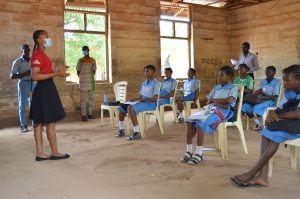
How would you describe yourself?
My name is Glorious Erhuanga. I am a Christian, 18 years old and from Edo State. I was born into a family of five, as the last of three and I am currently a 100 undergraduate level student of English Language at the University of Lagos. I am also an ambivert. I am also a fashion designer who is still learning and I am passionate about my personal growth and development.
What do you love to do, aside from fashion and schooling?
I love praying and meditating. I love planning, directing and anchoring programs. I also love sleeping: I don’t like stress.
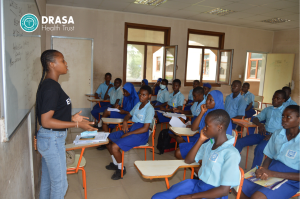
What was it like growing up in your family?
It’s funny, being the last of three and the only girl. I get to learn more because my brothers are intentional about me. It was always about “Glorious don't do this or that.”. They were always watching out for me. They are always there to talk to.
Would you say that being selected for the health and hygiene club was a game changer for you? How did you feel when you became a part of the club?
The choice of who would be an ambassador was by balloting, so I wasn’t initially selected because I picked a “No” during the balloting. Thereafter, I went to the focal teacher and still indicated my interest in joining the health and hygiene club. So let me in on the grounds that one of the students who picked a yes during the balloting was not around, and I would have to keep attending club activities but will step down when she returned, since club membership was capped at 30 student ambassadors. This student would later decline the opportunity when she resumed. So I continued being a club member. Yes, it was a game changer. I was excited to finally be a member and I learned a lot of new things.
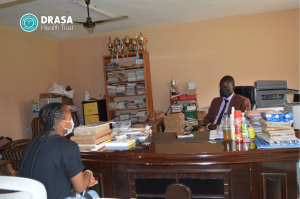
What thing(s) did you specifically take away, which you did not know before you joined the club?
My experience was helpful and I gained knowledge. I took out a few things which I didn’t know before like antimicrobial resistance, how germs are transmitted, why we should take only drugs prescribed by a doctor or pharmacist. It has been beneficial not just to me but to people around me, like my friends, because I get to talk to and educate them also on these issues. I let them know that it’s best to not self-medicate or take drugs simply because they are tired or feel pains, as this is what I used to do before I became a member of the club.
What has your experience been with DRASA since you graduated from school?
My experience with DRASA has been awesome, fun and great. It was not just about gaining the knowledge but also sharing the knowledge. Going to Osun State to meet with and engage the new ambassadors recently was a happy moment for me, I could see that the new ambassadors were impacted and ready to learn. They saw that if I could make this level of impact as an old ambassador, they could do the same too.
What opportunities have you gotten through DRASA?
Yes. The first opportunity was to write an article on AMR for the WHO. It was great and I never thought I would be featured on the WHO website. The other thing was being able to speak with the new ambassadors.
What was the best part of being a DRASA Ambassador
For me my best part was our group assignment of coming up; with a comic character. I was the one who came up with the name of the germ as Flying Foggy, and came up with a description for the germ, so that the other members of the team drew the germ, we coloured it and we won. I also wrote the story script for my group’s drama presentation. It was so much fun and I cannot forget it.
From what you have said so far, DRASA has let you play to areas of strength, which are speaking and writing.
Yes, they have.
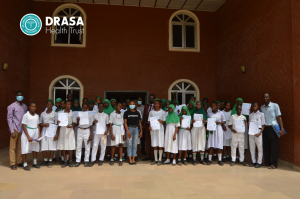
You had mentioned earlier about sharing the lessons learned with those around you? Tell us more about the people you shared it with? What did you share exactly? How did they react?
I shared the lessons learned with my family, friends and neighbours. After the lesson sessions with DRASA, I started buying and using hand sanitizers. I also share my hand sanitizer with people around me, especially when there is no source of water to wash hands. I also spoke to people about washing their hands even when they are not physically dirty. I also spoke to them about the daggers or antimicrobial resistance and why it is important to take only drugs prescribed. Their reaction was not bad, they took to corrections and expressed gratitude for the knowledge shared, they were happy to learn that they can wash their hands not only when they want to eat.
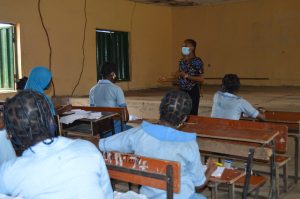
Seeing that you are now immersed in your undergraduate studies, what insight from the club activities have helped you stay safe/healthy or help others stay safe/healthy in the university environment?
I haven’t done much as I spent only a week in school before the nationwide ASUU strike. But before then I only go to school from home when I have clases. Then, I would just share my hand sanitizer with my course mates or people around me when I use my hand sanitizers.
What message do you have for other young/new ambassadors who are seeking to also use lessons from the club activities to make an impact?
I will say “You cannot make an impact if you are not impacted”. So, for you to make an impact, you have to stay in the club, be determined to learn, keep learning, practice what you have learned, and enjoy every moment you spend in the club.




